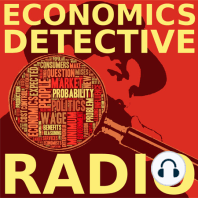51 min listen

The Basic Income Guarantee, Freedom, and the Welfare State with Otto Lehto
The Basic Income Guarantee, Freedom, and the Welfare State with Otto Lehto
ratings:
Length:
36 minutes
Released:
Dec 9, 2016
Format:
Podcast episode
Description
What follows is an edited transcript of my conversation with Otto Lehto. Petersen: You're listening to Economics Detective Radio. My guest today is Otto Lehto of King's College London. He is formerly the chair of Finland's Basic Income Network. Otto, welcome to Economics Detective Radio. Lehto: Oh it's my pleasure to be here. Petersen: So our topic for today is the basic income guarantee. Otto, you approach this idea from the perspective of political philosophy, so let's start by discussing that. How about we start by talking about two of the major figures in political philosophy: John Rawls and Robert Nozick. What do each of them have to say about the welfare state and where do your views diverge from theirs? Lehto: That is a good point to start indeed, although it is I think a bit lamentable that we have to start from those two figures because they have dominated the discussion so much during the last 50 years. In fact, it's very hard to have a conversation outside the boundaries set by those two figures, but they're both geniuses. They set the stage for the discussion, certainly in philosophy but also in public policy in many respects. So, let's start with John Rawls. John Rawls really was a towering figure in Harvard, really starting from the 60's and throughout the 70's. He wrote this book, A Theory of Justice, which is considered one of the really truly great books in political philosophy that revolutionized the way we think about these subjects. But the short version of his theory, which is very influential even up to this day, is that people in societies should look at the framework of living with each other as a cooperative game where we all try to sort of not only maximize our own position but also to make the whole game fair for everybody. And so he called his theory Justice as Fairness, where people are entitled to a certain respect and autonomy, certain liberties as members of the democratic community where they can pursue their own ends. But they're also entitled to a redistributive scheme if they happen to be among the worst-off people in the society. They are entitled to redistributive transfers. This framework sounds very familiar and indeed it should because it reflects the social democratic reality in which most Western societies operate. And even in later years he said that actually his philosophy, even though it starts from first principles and proceeds from there, is actually meant to be a philosophical justification of the intuitions that people in Western democracies---liberal democracies---have. So, you combine liberal ideas of individual freedom with these notions of the welfare state and so on. So that was the foundation of Rawls' system. So that's Rawls' system but Nozick came along and he found a place for himself in the same institution, that is Harvard, and he wrote a critique---a respectful critique---but a very thorough and deep critique of Rawls' theory. And he ended up justifying a minimal state that libertarians are very fond of. And he effectively said that no, people should just be seen as individuals who have some fundamental rights---he calls them side constrains---that people have a certain respect that they are owed by other people and it is very wrong for people to violate their personal boundaries and this includes the State. The state has actually no right to violate the sort of inviolable right to property rights that individuals have. So every form of taxation, that features very prominently even in Rawls' system, is theft. So, that is of course a very prominent theme in libertarianism. So his book---which by the way is really brilliant philosophically, it's not only just a standard justification of libertarianism but it's actually one of the great books in philosophy because it's so rich and powerful and full of interesting ideas and strange examples and brilliant footnotes and all that---but that lay down the other side. And so the debate in intellectual philosophy and histor
Released:
Dec 9, 2016
Format:
Podcast episode
Titles in the series (100)
Trailer Parks, Zoning, and Market Urbanism with Nolan Gray: Today's guest on Economics Detective Radio is Nolan Gray. Nolan is a writer for Market Urbanism and the host of the recently launched Market Urbanism Podcast. Market urbanism is the synthesis of classical liberal economics and an appreciation for... by Economics Detective Radio